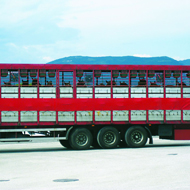With no water available during their journey, the horses were dehydrated and eager to drink as soon as they could.
Transportation times and conditions revealed in account
World Horse Welfare has released an account detailing prolonged journey times and poor conditions for horses travelling to slaughter. The charity released video footage to show the impact of long-distance journeys on horses’ physical and mental state.
Using a 1,400 mile journey from Poland to Italy as an example, in 60 hours of travels, horses were only given one rest stop. The charity monitored the condition of the animals during the process and cited dehydration, withdrawal and deformed feet. The animals were required to spend up to 24 hours travelling at one time.
Field officer Tony Evans said: “Stallions had been tethered at the rest stop next to mares, with young foals mixed in. With no water available during their journey, the horses were dehydrated and eager to drink as soon as they could. The horses were quiet, withdrawn and tense. It was a heartbreaking sight for anyone to see.”
In an ongoing campaign about transportation conditions, World Horse Welfare continues to gather evidence which will be detailed in a report to the European Commission addressing the current laws surrounding horse transportation.
Since the campaign began, partitions in transportation lorries have been improved to reduce injury and death. The overall transportation figures have also dropped from 165,000 in 2001 to 54,000 in 2012.
Image © World Horse Welfare







 The latest
The latest 
